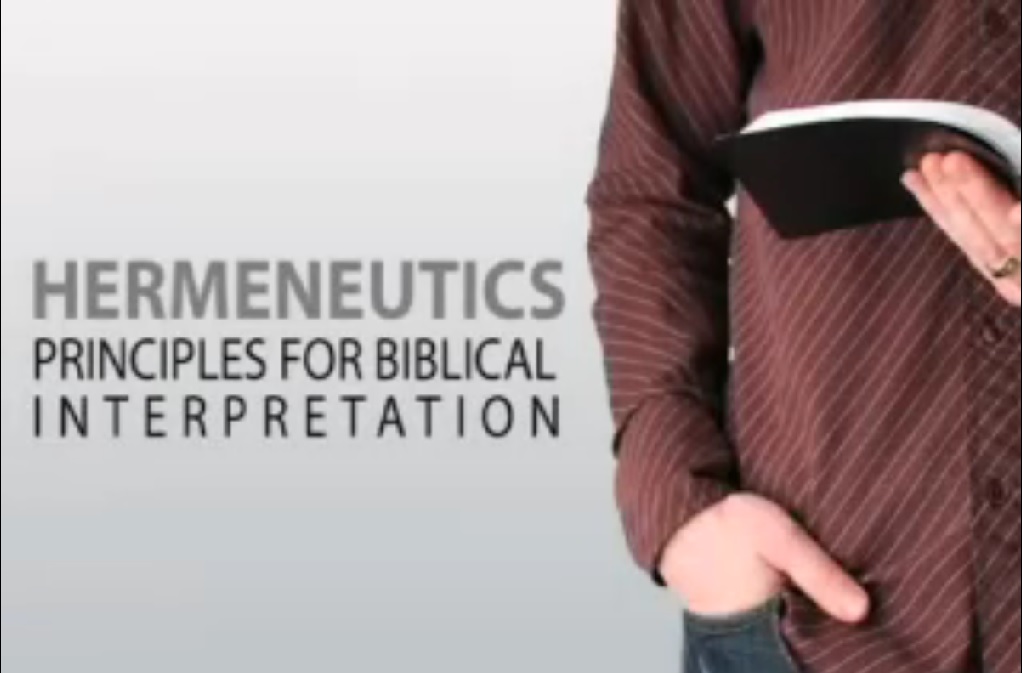This course is devoted to an investigation into the art of interpreting the canonical text of Scripture.
-

001. Introduction to Course
James Voelz
Introduction to how the class and class work will be accomplished.
-
![002. Basic Issues of Interpretation (Preface, Introduction [of Textbook]) by James Voelz 002. Basic Issues of Interpretation (Preface, Introduction [of Textbook]) by James Voelz](https://scholar.csl.edu/biblicalhermeneutics/1001/thumbnail.jpg)
002. Basic Issues of Interpretation (Preface, Introduction [of Textbook])
James Voelz
The effects of Modernism, Post Modernism and Soft Post Modernism on our understanding of the Bible.
-

003. Contrasting Models of Language (4A)
James Voelz
How emergence theory is used to understand the ideas of the Biblical events and stories.
-

004. Contrasting Models of Language (cont'd) (4A); Basic Linguistic Categories (4)
James Voelz
The conceptual signifiers rather than words give a composite meaning and aid in our interpretation of the text.
-

005. Basic Linguistic Categories (contò019d); the Communications Model (4)
James Voelz
The meaning of the larger whole is significantly more important than the parts, so we should not be distracted by the meaning of a word.
-

006. Language Structure and Thought (4-B); Taxonomy of Meaning; Illegitimate Totality Transfer (5)
James Voelz
The danger of bringing information that is not relevant to the understanding of the text and how language and thought limit each other.
-

007. Taxonomy of Meaning (cont'd); Register/Bible Translations; Signifiers as a Matrix/Eph. 4:11-12 (5)
James Voelz
Applying taxonomy to the interpretation of the Bible and the problems.
-

008. Interpreting a Matrix of Signifiers (cont'd), and the Relationship of this Issue to the Canon of Scripture (5-B)
James Voelz
What became part of the Canon and how your matrix affects the key to understanding the Bible.
-

009. Canon Issues (cont'd) (5-B); Keys to the Matrix (cont'd) (5)
James Voelz
The keys to the matrix are affected by which books you use as your Canon within the Canon.
-

010. Three So-Called "Levels" of Signifiers and Textual Interpretation (6)
James Voelz
The three levels of meaning are the sense of the text, significance of the text and three implication of the text.
-

011. Interpreting on Level 2 (cont'd); Form Criticism and Redaction Criticism as Level 3 Procedures (6)
James Voelz
How Form and Redaction Criticism can affect how we understand Biblical Text.
-

012. Non-Literal Language (7)
James Voelz
The difference between Literal and Non-Literal and sometimes "is" means is.
-

013. Class Debate on Language Concerning God/"God-Talk" (7-A)
James Voelz
A debate on "Given our contemporary culture it is acceptable to address God as our mother."
-

014. Debate Debriefing (7-A); Key Non-Literal Language Usage Issues (7)
James Voelz
How Non-Literal usage affects the understanding of ideas expressed, creating a Loose Usage that can apply to many similar ideas.
-

015. Metaphor and Narrative (7); Language Usage in Discourse as "Shorthand" (8)
James Voelz
Every linguistic utterance whether spoken or written is shorthand and you have to fill out the longhand.
-

016. Language Usage as Shorthand (cont'd) (8)
James Voelz
Certain nouns come with "external entailments" that are part of the understanding of the information.
-

017. External Entailment (8)
James Voelz
Eternal entailments and how we interpret "Ministry" and the "Call".
-

018. External Entailment (cont'd) (8); Complexities on Level 2 (9)
James Voelz
The Epistles tend to be Level I signifiers and the Gospels ten to be Level II signifiers.
-

019. Relationship between Level 1 and Level 2 Signifiers; Historicity of Narrative and Allegory.
James Voelz
How does the Historic Narrative and Allegory differ from each other and change our interpretation of events.
-

020. Interpretation as Involving Two Texts; Interpreting as "Constructing" Meaning (10)
James Voelz
How our perceptions and intentionality affect and how you interpret the Bible.
-

021. Role of the Reader in Interpreting a Text; Validity in Interpretation; Tradition and Scripture (11)
James Voelz
Interpretation is made from within the faith and some questions can be answered from the use of Regula Fedei.
-

022. Tradition and Scripture (cont'd) (11)
James Voelz
The importance of the Apostolic Authority as supported by the Regula Fedei and recognized by the Lutheran Confessions.
-

023. The Holy Spirit and Scriptural Interpretation (11); Nature of Scripture (11-A)
James Voelz
Inerrancy and being precise enough for readers to understand their intended purpose.
-

024. The Kingdom of God and Proleptic Eschatology (11-B)
James Voelz
The End Times three views Christus Victor, Johanian and Pauline.
-

025. The Kingdom of God (cont'd) (11-B); Basics of Pragmatics (12)
James Voelz
Prophesy in the Old Testament can have both immediate and Eschatological meaning. The difference between Speech/Act theory and performative speech and how it impacts preaching.


